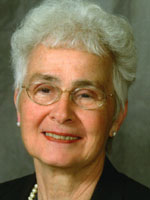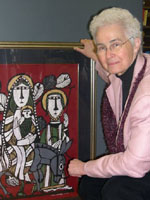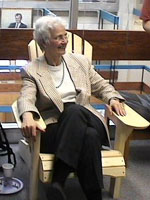 |
Faith Rohrbough was dean and vice president of the Lutheran Theological Seminary at Philadelphia for 13 years. In 1996, she moved to Saskatchewan to become president of Lutheran Theological Seminary, Saskatoon. She retired in 2004.
PHOTO BY TRUDY JANSSSENS |
What does it take to survive as a seminary president, much less thrive? Clearly there are no cut-and-dried formulas, otherwise the person best able to follow directions would be the most successful.
Every seminary setting is unique. So, saying that my coming to the Lutheran Theological Seminary at Saskatoon was unique doesn't tell us much. Nevertheless, in 1996 I set off to a new country with a culture different from my own, a new educational system, a new church and — above all — a new vocabulary. I was so busy trying to do the paperwork to get a work visa that I did not have much time to think about what I was walking into.
The work visa did not come through until the middle of October. None of my furniture or other belongings (including clothes) were permitted across the border until the work visa was processed. The only furniture I had was a plastic garden table and two garden chairs. The one advantage in all of this was that my office at the seminary was far more pleasantly furnished than my home. I literally lived in my office a good deal of the time. My large collie and two cats liked having all the empty space in the house, however, and were at a real loss when the rooms were suddenly filled at the end of October and they couldn't use the place as a racetrack any longer.
Everyone wanted to see the new seminary president. I was, after all, the first woman seminary president in Canada and the first woman to be president of a Lutheran seminary in North America. I expected to have to deal with the women's issue relatively quickly, but the biggest hurdle I had to deal with was that I was an American. Wasn't there a single Canadian Lutheran with the ability and experience to be president of the seminary? Why did we have to choose an American?
The second issue that was of greatest concern in my constituency was that I was not ordained — I had no parish experience. How could I possibly lead a seminary to train parish pastors when I had never been one myself? I was ordained to my position (the constitution requiring it) but it wasn't the same.
There were a host of other issues that people brought up. To my amazement, the issue of my being a woman was never raised, at least within my hearing!
When I arrived in Saskatoon at the end of August, I discovered that three principal staff people had resigned in the six weeks before my coming, all to take other positions — the vice president for business/finance and development, the head of maintenance and the head cook. I hired someone to keep the books and took on the business and development pieces myself. Reasoning that anyone with experience can cook, I put the second cook in charge of the kitchen. The person who had been second in the maintenance department had already been elevated to head by my predecessor.
 |
Rohrbough gave this Sadao Watanabe print, and another that matches it, to the seminary at her retirement.
PHOTO BY BEATRICE CARLSON |
My quick but unresearched decision on the cook gave me grief all year. I finally realized I had to get professional help in hiring someone new. Taking on the business and development portfolios of the institution gave me a crash course in how the school was financed and how it was run.
I suspect that one of the reasons I was called to Saskatoon was my extensive experience within ATS. The seminary was facing its decennial review and they wanted leadership that would assist them through that. I took the opportunity to send faculty and staff members to every workshop that was held — the cost of a plane ticket and registration was peanuts compared to the development opportunities and contacts that our small school could access.
There are a host of other organizations not affiliated with ATS that nevertheless work closely with the association — In Trust Inc., the Fund for Theological Education, the Wabash Center, and others. All of these have splendid resources that we accessed at every opportunity. LTS has had a lot of turnover on its board. So we have been twice to In Trust board seminars. In Trust magazine is required reading for every board member.
Enough about my own experiences. What would be helpful to me if I were starting all over again as a very green seminary president?
1. Learn your school's story.
Get to know the history and culture of your school as thoroughly as possible. Don't make all kinds of assumptions about how things are done and what issues are important. Learn as much as you can from conversations with those who have been around for a while as well as official histories of the school. Take the time to read minutes, particularly those of the faculty and the board. If you go back at least 10 years you will begin to find out what the issues are that keep coming up repeatedly. You will also begin to see why the board and the faculty made some of the decisions they did. Particularly if you want to bring change to the institution, you must know what is at the root of the way things are done now.
2. Know the facts.
 |
At her May 2004 retirement party organized by the students, Rohrbough received an Adirondack chair, but she has not had much time to use it so far.
PHOTO BY GRACE MACLENNAN |
Make yourself familiar as quickly as you can with all the facts and figures about your institution. If you don't know how to read a balance sheet, learn! If you are not getting financial statements that are useful and readable, get them changed so they give you the information you need.
3. Develop yourself.
Look to your own professional development. I have mentioned how important it is to access every opportunity for your faculty and staff. Do the same for yourself. Most studies show that people do professional development in the areas that they like, rather than where it is needed. Try to be as objective as you can about your weaknesses and use some of your professional development opportunities to get experience in areas you are less comfortable with.
4. Find a mentor.
None of us is so old or experienced that we cannot benefit by meeting and talking with someone we trust — someone with sound judgment and even more experience. I was really quite startled when Barbara Brown Zikmund, then president of Hartford Seminary, made this suggestion when I was a new president. Nevertheless, it is a piece of advice I have never forgotten and from which I have benefited immeasurably.
5. Care for your loved ones.
Look to the well-being of those who are near and dear to you. You need to find space in your life for yourself and your family — or, if like me you are single, for those close friends who make up your family.
The most important gifts you can bring to your institution in these early days and months of your presidency are patience, common sense, and the art of listening.
 |
Lecturing in 1979 at Lutheran Theological Seminary in Philadelphia.
PHOTO COURTESY FAITH ROHRBOUGH |
My father used to tell the story of the young man who left the hills of Appalachia and on a full scholarship went to Harvard University. He quickly began to feel like a fish out of water. A graduate of a consolidated high school in West Virginia, he often felt lost in conversations with his classmates, many of whom had come from posh prep schools. One day, in the second week of that first term, his roommate asked him if he liked Botticelli. Having no idea who or what Botticelli was, the young man decided it was time to pack his bag and head home. He went into the dean's office to tell him of his decision. The dean listened to the tale of woe and then calmly replied, "You know, half of education is just hanging around until you catch on."
That would be the best advice I could leave with you out of my own experience. If at times you feel overwhelmed, just hang around until you catch on.